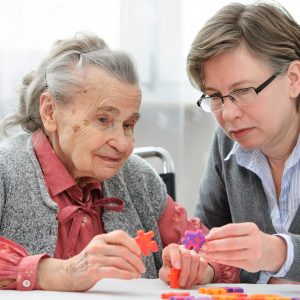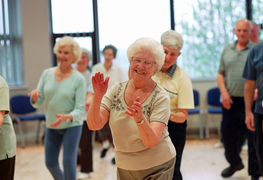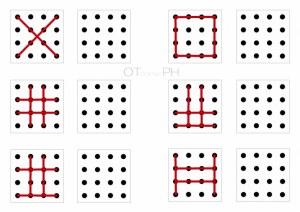Activities to improve cognitive skills in Dementia
Activities to improve cognitive skills in Dementia
 loss in their cognitive abilities (memory, thinking and reasoning) and behavioural skills. It leaves them confused, frustrated, depressed and also affects their quality of life terribly.
loss in their cognitive abilities (memory, thinking and reasoning) and behavioural skills. It leaves them confused, frustrated, depressed and also affects their quality of life terribly. Cognitive stimulation and Dementia
- Fortunately, a growing body of evidence suggests that cognitive stimulation of the brain helps in declining the pace of progression of the condition.
- It also reduces the risk of development of Dementia in at-risk individuals.
- Mentally stimulating activities help the brain to create reserves of healthy brain cells and the connections between them. These healthy reserves further compensate for the functions of the damaged brain cells and help delay the disease progression.
Cognitive stimulation activities
For persons with Dementia, the activities should mainly focus on strengthening their existing skills and developing additional skills.
How to improve cognitive function
The complexity of the tasks can be varied from difficult and challenging ones to simple and easy ones as the disease progresses.
Mentioned below are some of the tasks which help to enhance cognitive skills. Family members or a therapist can facilitate these activities and can either be practised in a group or individually.
Dancing:
 Regular dancing has a positive impact on improving memory skills in persons with Dementia. It releases chemicals stimulating positive emotions in our brain and also assists in getting back old memories.
Regular dancing has a positive impact on improving memory skills in persons with Dementia. It releases chemicals stimulating positive emotions in our brain and also assists in getting back old memories.
How to improve cognitive function
Music:
- Music has a life-changing impact on persons with Dementia.
- Singing and playing music improves planning, programming, and memory skills.
- Even with impaired memory and cognitive skills, persons with Dementia may still retain their ability to learn music, remember and to sing.
- There are numerous incidents documented where persons with Dementia who were unable to talk previously, improved their speaking abilities after listening to their favourite songs from the past.
Gardening:
- Spending time outdoors and taking care of plants give people with Dementia a feeling of connection with the outer world.
- It provides them with a purpose and is also very rewarding with its results.

- Gardening is also a great activity to calm down for persons who feel restless or agitated. It helps to bring inner peace and to develop concentration.
- By allowing them to design the garden and to choose their favourite plants, further assist in fostering their imagination, memory and reasoning skills.
Puzzles:
Undoubtedly, solving puzzles like crosswords, scramble, and sudoku are great activities to improve memory, problem-solving and reasoning skills. These puzzles are also available in varying levels of difficulty.
Card games and board games:
- Card games are a great option as they can be played in many ways. One can look for the same pair of cards from a deck of cards or find the missing card after the entire set of cards was seen before.
- The complex games comprise of the ones in which multiple rules have to be followed and require higher-level thinking skills such as Rummy.
- We can choose an appropriate game depending on each person’s cognitive skills. The person can start playing the complex games initially and further move into simple ones as the disease progresses.
- Similarly, board games are also available in varying levels of complexity. They are an excellent means to remain mentally active and also to spend fun time with others.
Memory games:
Word chain:
- This is a multiplayer game which does not require any pen or paper. We can ask the person with Dementia to choose a category such as Vehicles, Vegetables, Country names etc. Now, the first player can name an item belonging to the selected category. The next person can tell another name along with the name told by the first person. Like this, each of the players takes turns alternatively; adding up more names to the previous names hence builds a chain.
- Those persons who are at the initial stages of Dementia can attempt to build long chains. This task can be difficult for persons in the later stages of the condition.
Copying the pattern:
- This is a pen and paper activity. The person with Dementia is shown patterns drawn on a paper and they have to copy the patterns as they are.

- This task can be made complex for those with less problem severity. He or she can be allowed to see the pattern only for a short while and can be given complex patterns. The person should attempt to draw the pattern from his or her memory.
Going through an old photo album:
- Revisiting old photos play a crucial role in bringing back memories of good times. While showing the old photos, we can ask the person to share their memories about the location in the photo and also about the people in it. If they find it difficult to remember, we can provide sufficient cues to help them recollect the names correctly.
Along with these, some activities from our routine life also helps to stimulate the brain.  These include reading the newspaper/book aloud, cooking, preparing shopping list, going for shopping and calculating bills etc. It is also beneficial to learn a new language or a skill by enrolling into a course, and to also develop new hobbies.
These include reading the newspaper/book aloud, cooking, preparing shopping list, going for shopping and calculating bills etc. It is also beneficial to learn a new language or a skill by enrolling into a course, and to also develop new hobbies.
We must encourage them to keep up with their usual hobbies, social activities and to stay connected with people.Being mentally and socially active improve their cognition and also enhance their daily functioning skills and overall well being.
How to improve cognitive function
- AAC for Children with Autism - December 22, 2022
- Tools for Speech Impediments - November 25, 2022
- Voice TipsFor Teachers During Online Teaching - October 4, 2022



Leave a Comment
(0 Comments)